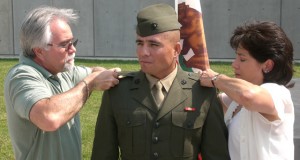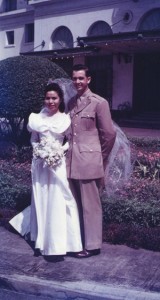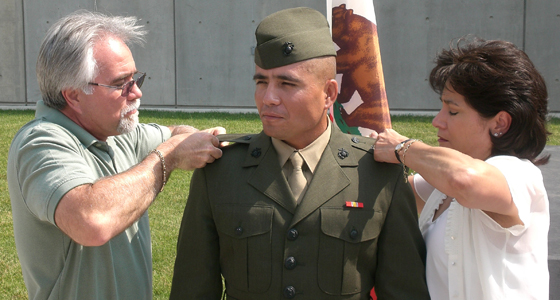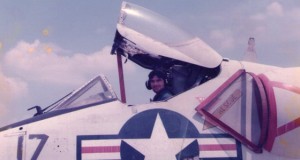
Jack Harding Sr., left, and Natalie Harding pin lieutenant stripes to the uniform of their son, Jack Jr. Photo courtesy of Jack Harding Sr.
By Sarah Kyo, Public Affairs Assistant
The Hardings can thank multiple family members for their military service, including three generations of men named Jack.
Natalie and Jack Harding Sr. are SJSU staff members: She is the director of Academic Budgets, and he works on all of the campus telephone lines, as the telecommunications network analyst.
Their son, Jack Jr., graduated from SJSU in 2005 with a bachelor’s degree in occupational therapy.
After completing internships, Jack Jr. thought about what to do with his post-college life. During that time, two people close to him died, including his grandmother.
“When she passed, it put things into perspective that basically I just needed to do it,” Jack Jr. said about joining the military.
Jack Jr. shocked his parents when he told them that he had enlisted in the Marines.
“We never really wanted him to join because of the war that was going on,” Jack Sr. said.
Jack Jr. said he knew joining the military during wars in Afghanistan and Iraq meant deployment. What was most important to him, though, was serving his country. Natalie says Jack Jr.’s grandmother influenced her son’s decision.
“My Lola had a huge impact on it,” Jack Jr. said of his grandmother. She would tell her grandson that he would make a good officer.
Jack Jr. was in Afghanistan for seven months. He recently earned the rank of captain.
The late matriarch and patriarch, Clara and Jack – affectionately known as Lola and Grandpa Jack – impacted their family’s attitudes and experiences with the military.
After all, the U.S. military brought together a poor boy from an Arkansas farm and a young girl from a wealthy Filipino family.
World War II and Its Aftermath

Jack Harding Sr.'s parents, Clara and Jack, pose for their wedding portrait. Photo courtesy of Jack Harding Sr.
Wanting to make a better life for himself, Grandpa Jack voluntarily enlisted in the U.S. Army Air Corps, predecessor for the Air Force. He would make a career out of his service, traveling to locations as diverse as the Pentagon and the Philippines.
It was in the Philippines where he met his future wife Clara, who worked at the United States’ Clark Air Field Base.
During World War II, not long after the attack on Pearl Harbor in 1941, Japan gained control of Clark Air Field Base. Clara and her family lived nearby in Angeles City, so they fled to the city of Bataan.
They thought the American forces were going to save them, but they never came, Jack Sr. said.
Instead, the Japanese captured Clara and her family, who became part of the 75,000 American and Filipino prisoners of war involved in the infamous Bataan Death March. Thousands died during the brutal return to the capital city, Manila.
To protect her daughters from being raped by soldiers, Clara’s mother put dirt on their faces and matted their hair to disguise their beauty – it worked.
Clara’s father was sent to a prison camp, where he would eventually die. A brother died in a siege at Corregidor Island in the Philippines.
During the United States’ Liberation of Manila in 1945, Clara and her remaining family lived in a bomb crater covered with tin. They were stuck in the middle of a fierce battle, and Clara lost another brother that night.
“Her brother was killed that night by an artillery shell,” Jack Sr. said. “He came outside of the hole to make sure they were going to be OK, I guess, and an artillery shell hit a tree he was sitting under and killed him.”
The next day, they heard a rumbling sound and popped out of the hole in the ground, only to be surrounded by — U.S. troops, who saved them.
“They scared the crap out of some poor, young G.I. because they were all dirty,” Jack Sr. said. “They looked like rats living in these holes.”
A couple years after the liberation, Clara met Grandpa Jack, stationed at nearby Clark AFB. They married and started a family.
Jack Sr. became emotional when thinking about his late mother and what she had been through during the war.
“She’s indebted to this country and the military because they saved her and her family,” he said, his voice breaking and his eyes teary. “That’s why she always encouraged my son and myself to join the military because of what they did.”
The 1970s and Beyond
After retiring from the military in 1973 as master sergeant, Grandpa Jack moved his wife and eight kids to San Jose. Jack Sr. said he didn’t do too well in school, so his mother suggested that he look into the military.
“Maybe they’ll straighten you up, and you’ll enjoy it,” she told him.
Jack Sr. actively served in the U.S. Navy as a jet mechanic from 1976 to 1980, and was in the reserves for eight years afterward.
He said he loved the experience, which gave him responsibilities and leadership training.
For the Hardings, Veterans Day is about family. Jack Sr.’s wife, Natalie, thinks of the sacrifices that families make for their loved ones who are serving.
For Jack Jr., he acknowledges his family at home and his fellow soldiers, “the family in your mind that you’re fighting for and the family next to you that you’re fighting with.”
Jack Sr. expressed thanks to those who serve in the military.
“You know, my mom appreciated the American military ’til the very end, which she tried to instill in us, which she did and we all do,” Jack Sr. said. “All I can say is what these young men and women sacrifice for this country, life and limb, where would we be in this country without them?”


